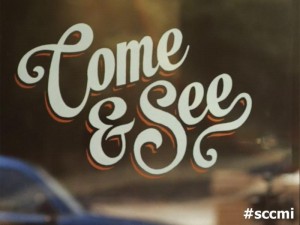
A Part, Not Apart*
Sycamore Creek Church
March 29/30, 2015
Tom Arthur
Peace friends!
Everyone wants to feel needed. The alternative is feeling unneeded . . . dispensable. There is nothing super about being superfluous. We go to college, learn new skills, attend leadership conferences, and take on additional projects in order to become indispensable. Becoming truly indispensable is hard. Most of us carry insecurities that we aren’t really needed. Not needed in our job. Not needed by our friends. Not needed in our family.
Here’s some good news: Jesus started a movement called the church. You have a role to play in that movement. Your role is indispensable. The church is one place where you can’t be replaced.
Today we wrap up a series called Come & See. We’ve spent four weeks looking at how people come to follow Jesus. It all happens through a simple invitation: Come and see. Jesus followers had a simple goal: The goal was not to explain something, but to experience someone. Today I want to prove to you that you are an indispensable part of people experiencing Jesus.
There is a big upside to feeling indispensable. You’ve got job security, a raise is in your future, maybe even a bonus. When it comes to relationships, being indispensable means feeling like others need us.
On the other hand, there are a lot of downsides to feeling dispensable. When you feel dispensable you feel superfluous, nonessential, expendable, unnecessary, discretionary, especially when the economy turns. And it gets even worse when you feel dispensable in your relationships. Anxiety. Depression. Anger. Loneliness. Some might even feel suicidal. These are pretty bad so we work hard to keep from feeling dispensable.
It’s really hard to be indispensable. Where are you truly indispensable in this world? The closest thing I could come up with is that as a parent, you’re pretty indispensable. No one else can really be the parent of your child. But then there comes this period of time called the empty nest. So when you’re a parent you’re always saying the long goodbye. You are indispensable for a season.
But there is one opportunity and one place where you are truly indispensable: the church. I’m guessing that none of you woke up thinking “I’m indispensable to my church.” Even the leaders didn’t wake up thinking this. If you’re a leader and you don’t show up for worship, we’d scramble but we’d work it out. If Jeremy wasn’t here to lead worship, we could throw up some worship videos. Even if I wasn’t here, you could find some better preacher online and show that video. But the truth is that each one of you is indispensable. Let me show you why.
Jesus’ followers were on a wild upward ride. It was a serious adventure! Traveling around the countryside healing people, preaching the good news, confronting the powerful religious leaders of the day. But then their adventure took a downward turn at the cross. Jesus died. He was executed. The adventure came to an immediate halt. What happened?! But then a few days later and he’s back! They’ve got to be thinking, what will Jesus do next? And what he would do next is almost as unthinkable as the cross. He left.
Jesus knew that this would be crazy and it was his plan all along so he told his followers:
I have told you these things before they happen so that when they do happen, you will believe.
~John 14:29 NLT
His followers have got to be saying, “Jesus, how is this a good plan? You’re the one who leads, we keep messing it up.” But Jesus says, “I’m leaving because I’ve got a better plan, a better plan than me. My plan is y’all.”
But you [y’all] will receive power when the Holy Spirit comes upon you. And you will be my witnesses, telling people about me everywhere—in Jerusalem, throughout Judea, in Samaria, and to the ends of the earth.
~Acts 1:8 NLT
The “you” in the Greek, the original language this was written in, is a plural you as in “y’all.” Jesus’ plan was not any one of you, but you all. All y’all.
After saying this, he was taken up into a cloud while they were watching, and they could no longer see him.
~Acts 1:9 NLT
I’m sure the disciples were stunned. They’re thinking, “Don’t go, we’ve got questions!” But here’s what happened next. From a dozen followers, come a couple dozen to a hundred to several hundred to thousands and by 100AD there were 1,000,000 (1 million) followers of Jesus when the population of the world was 181 million. That means that 0.6% of the population was following Jesus. From 12 to 1,000,000 followers. But the story gets even better. Today there are about 2,200,000,000 (2.2 billion) followers of Jesus and the population of the world is 6,900,000,000 (6.9 billion) or 31.6%. Wow! Jesus’ plan worked: Y’all.
Paul, one of Jesus’ followers and the first missionary of the church thought deeply about the indispensability of each person in the church and he came up with a metaphor to describe it. Paul said you were an indispensable part of a body:
The human body has many parts, but the many parts make up one whole body. So it is with the body of Christ. Some of us are Jews, some are Gentiles, some are slaves, and some are free. But we have all been baptized into one body by one Spirit, and we all share the same Spirit.
Yes, the body has many different parts, not just one part. If the foot says, “I am not a part of the body because I am not a hand,” that does not make it any less a part of the body. And if the ear says, “I am not part of the body because I am not an eye,” would that make it any less a part of the body?
~1 Corinthians 12:12-16 NLT
Regardless of what part, each part is a part of the body. Each part contributes to the overall purpose and value of the body. That’s what the church looks like. Paul goes even further into this metaphor:
If the whole body were an eye, how would you hear? Or if your whole body were an ear, how would you smell anything?
But our bodies have many parts, and God has put each part just where he wants it. How strange a body would be if it had only one part! Yes, there are many parts, but only one body.
~1 Corinthians 12:17-20 NLT
For the body to be the body, no part can be apart. In fact, it’s gross if a part of the body is apart from the body. Jeremy’s brother-in-law found a foot on the beach in the Puget Sound near Seattle. Something had gone terribly wrong!
The eye can never say to the hand, “I don’t need you.” The head can’t say to the feet, “I don’t need you.” In fact, some parts of the body that seem weakest and least important are actually the most necessary…All of you together are Christ’s body, and each of you is a part of it.
~1 Corinthians 12:21-22, 27 NLT
You are indispensable. The body isn’t the body when your part is apart.
Jesus said: I’m leaving this to you. Paul said: You are a part of the body. So at SCC we want you to be part of the body. Here are three ways you can be part of the body:
1. Connect in a Group
You’ve got to get out of rows on Sunday and into circles the rest of the week. You don’t really get connected to the body when you’re looking at the back of the heads of the people in front of you. Worship is a place where we connect with God but it isn’t a place where we connect deeply with others.
We run our small groups at SCC on a semester based system. We’re currently in the spring semester. Then in May we host what we call GroupLINK to sign up for the summer semester. Then in September we host another GroupLINK for the fall semester. You are a part of the body when you connect in a small group.
2. Volunteer on a Team
Everybody can serve. You’ve all got some talent you can share with others. In fact, there is one team that we are all on: the hospitality team. All of us are on the hospitality team because a guest is going to experience this as a welcoming place less based on whether the pastor greeted them and more based on whether the person they sit next to greets them. So we’re all on the hospitality team. But there are also some key hospitality roles where you can volunteer. You can be a greeter and greet people at the door. You can be an usher and ush people. You can be a parking lot attendant and play traffic cop one day out of the week. We’ll even give you a special vest. You can help set up the Connection Café before worship each week and live out your inner desire to be an event planner. You can help clean the building each week so that it sparkles when a guest shows up. You can be an opener/closer/setup/teardown volunteer that helps get the building ready to welcome guests. After you’ve been here for six months and gone through a background check, you can volunteer with our children in the nursery or Kids Creek or you can help with our youth in StuREV. You are a part of the body when you volunteer on a team.
3. Invite a Friend
When you invite someone you connect to all the other parts. When you invite a friend to come and see, you’re giving all the other parts a reason to play their part. This Easter we’ve been encouraging you to fill out an Invest Invite Card. This card challenges you to invest time in three friends and pray for God to open a door to invite them to church. You’re not trying to throw a crow bar into the door and force an invitation, you’re investing time and energy in the friendship and you’re asking God to make the opportunity to invite natural. You are a part of the body when you invite someone to come and see.
When we’re a part of the body of Christ, people experience Jesus. Jesus needs to be experienced, not explained. People experience Jesus when each part decides to be a part of the body, not apart from the body. When you invite someone to come and see, you’re playing a part with every other person. When you invite someone, you’re giving them the opportunity to experience Jesus.
What happens when we all are a part of the Body? I recently came across a church named Sagebrush Church that followed how one invite had an impact on so many people. Watch and see:
Prayer
God, as we prayerfully ponder who we might invite to come and see at Easter, open the doors for the invitation to be natural. Gives us eyes to see that opportunity, that cue for the time to extend the invitation. Use our invites to give people an opportunity to experience your son, Jesus. In his name we ask these things, amen.
*Based on a sermon first preached by Joel Thomas



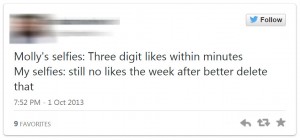
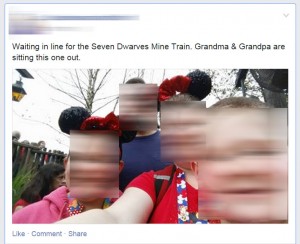


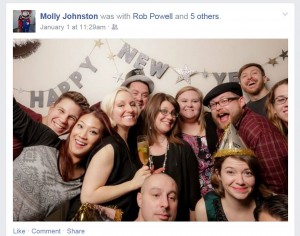



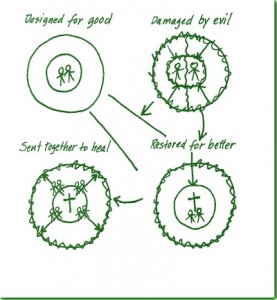

Recent Comments